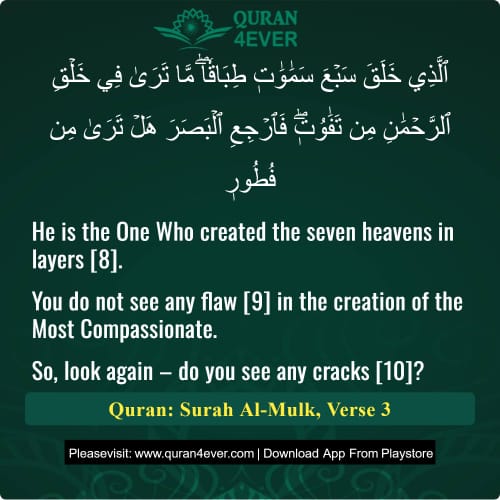
Transliteration:( Allazee khalaqa sab'a samaawaatin tibaaqam maa taraa fee khalqir rahmaani min tafaawut farji'il basara hal taraa min futoor )
"He is the One Who created the seven heavens in layers [8]. You do not see any flaw [9] in the creation of the Most Compassionate. So, look again – do you see any cracks [10]?"
This verse describes the creation of seven heavens, each one layered upon the other. These heavens are not necessarily fused together, but they exist in a structured, orderly manner. The creation of these heavens demonstrates Allah’s perfect design, where each layer complements the other without flaw.
There is a space of approximately five hundred years between each heaven, indicating a vast and unimaginable expanse. The verse invites believers to reflect on the perfection of this creation and to marvel at the harmony in Allah's design. Even in the grand scale of the universe, every layer is positioned with precision and purpose.
The verse harmonizes with the Hadith that mentions these heavens, and it encourages reflection on the intricate and flawless nature of Allah's creation, showing that there are no contradictions between the verse and the Hadith.
This part of the verse emphasizes that there is no flaw in Allah’s creation. Allah has created everything with exactness and appropriateness. Whether it is the heavens, the earth, or any other part of the universe, everything is in perfect harmony.
In this context, "flaw" refers to any imperfection or inconsistency. Allah's creation is a testament to His wisdom and mastery, where everything is exactly as it should be. No matter how vast or minute, each part of creation serves a purpose in Allah’s grand design. The perfection of creation is evident in everything from the heavens above to the smallest organisms on earth.
The verse further emphasizes that there is no sign of breakage, wear, or dilapidation in Allah's creation. The heavens are described as being flawless and impervious to deterioration. This can be understood as a metaphor for the infallibility and eternal nature of the universe as designed by Allah.
The reference to doors in the heavens signifies that there are points of passage, such as those used by the angels. These doors are not obstructive, and they do not disrupt the flawless nature of creation. For example, during the event of Me'raaj, the Prophet Muhammad (PBUH) entered through these heavenly doors, which are not physical flaws but rather part of Allah's perfect order.
Additionally, in Surah At-Tariq (78:19), Allah promises that the skies will open and become doors—a metaphor for the divine accessibility and infinite mercy. This reinforces the idea that the creation of the heavens is beyond human comprehension and contains depths of mystery and beauty.
The tafsir of Surah Al-Mulk verse 3 by Ibn Kathir is unavailable here.
Please refer to Surah Mulk ayat 1 which provides the complete commentary from verse 1 through 5.
(67:3) Who created the seven heavens one upon another.[6] You will see no incongruity in the Merciful One’s creation.[7] Turn your vision again, can you see any flaw?[8]
6. For explanation, see (Surah Al-Baqarah, ayat 29) note 34; (Surah Ar-Raad, ayat 2) note 2; (Surah Al-Hijr, ayat 16) note 8; (Surah Al-Hajj, ayat 65) note 113; (Surah Al-Muminoon, ayat 17) note 15; (Surah As-Saaffat, ayat 6) note 5; (Surah Al-Mumin, ayat 64) note 90.
7. Literally, tafawut is disproportion: two things being out of accord and in disagreement with each other. So, the divine words mean: You will not see any indiscipline, any disorder and discordance anywhere in the universe, there is nothing disjointed and out of proportion in this world created by Allah: all its parts are well connected and in perfect harmony and coordination.
8. The word futoor means a crack, rift, fissure, or a thing’s being split and broken. The verse means to say that the whole universe is so closely well-knit and everything in it, from a particle on the earth to the huge galaxies, so well connected and coherent that the continuity of the system of the universe seems to break nowhere, however hard one may try to probe and investigate. For further explanation, see (Surah Qaf, ayat 6) note 8.
[1712]- i.e., one covering or fitting over the other.

For a faster and smoother experience,
install our mobile app now.
Related Ayat(Verses)/Topics